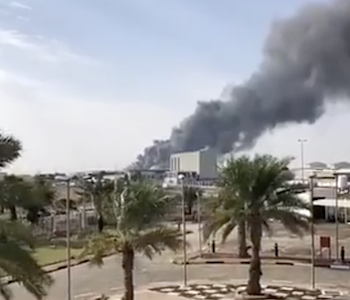A suspected drone attack by Yemen’s Houthi rebels targeting a key oil facility in Abu Dhabi killed three people and sparked a separate fire at Abu Dhabi’s international airport on Monday, police said.
Police in the United Arab Emirates identified the dead as two Indian nationals and one Pakistani. It did not identify the wounded, who police said suffered minor to moderate injuries at an industrial area where Abu Dhabi’s state-owned energy company runs a pipeline network and an oil tanker storage facility.
Abu Dhabi police said three fuel tanker trucks had exploded in the industrial Musaffah area near storage facilities of oil firm ADNOC and that a fire broke out at a construction site at Abu Dhabi International Airport.
“Initial investigations found parts of a small plane that could possibly be a drone at both sites that could have caused the explosion and the fire,” the police said in a statement on state news agency WAM.
Meanwhile, Yemen’s Houthi rebels claimed they were behind an attack targeting the United Arab Emirates on Monday, without immediately elaborating. The Iranian-backed Houthis have claimed several attacks that Emirati officials later denied took place.
The incident comes as Yemen’s yearslong war rages on and as an Emirati-flagged vessel was recently captured by the Houthis. Although the UAE has largely withdrawn its own forces from the conflict tearing apart the Arab world’s poorest nation, it is still actively engaged in Yemen and supports local militias there fighting the Houthis.
The UAE has been at war in Yemen since early 2015, and was a key member of the Saudi-led coalition that launched attacks against the Houthis after the group overran the capital of Yemen and ousted the internationally backed government from power.
The Houthis have come under pressure in recent weeks and are suffering heavy losses as Yemeni forces, allied and backed by the UAE, have pushed back the rebels in key southern and central provinces of the country, dashing Houthi efforts to complete their control of the entire northern half of Yemen.
Yemen’s government-aligned forces reclaimed the entire southern province of Shabwa from the Houthis earlier this month and made advances in nearby Marib province. They were aided by the UAE-backed Giants Brigades and had help from Saudi airstrikes.
The airport fire in Abu Dhabi was described by police as “minor” and took place at an extension of the international airport that is still under construction. For years, the airport home to Etihad Airways has been building its new Midfield Terminal, but it was not clear if that was where the fire took place.
Footage from Twitter shows a large plume of smoke rising from the area near the reported attack.
Etihad Airways said “precautionary measures resulted in a short disruption for a small number of flights” and that airport operations have returned to normal. Abu Dhabi Airports did not immediately respond to a request for comment.
The other blast struck three petroleum transport tankers near a complex for the Abu Dhabi National Oil Co. in the Musaffah industrial area. The company describes it as a pipeline and terminal facility located some 22 kilometres (13 miles) from the center of the city of Abu Dhabi, where 36 storage tanks also supply transport trucks carrying fuel. It is also a short distance from Al-Dhafra Air Base, a military installation that hosts U.S. and French forces.
The location of the ADNOC facility where the tankers caught fire is approximately 1,800 kilometres (1,100 miles) northeast of Saada, the Houthis’ stronghold in Yemen.
While Emirati troops have been killed in the war in Yemen, the conflict so far has not directly affected daily life in the wider UAE, a country with a vast foreign workforce that is also home to Dubai, a glitzy city of sky scrapers and five-star hotels.
(AP; Picture Courtesy: Twitter/Al Bawaba News)













